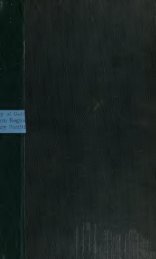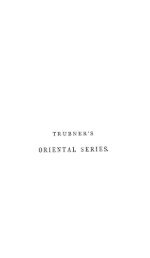Untitled
Untitled
Untitled
Create successful ePaper yourself
Turn your PDF publications into a flip-book with our unique Google optimized e-Paper software.
, divided<br />
NOTES ON THE SECOND DISCOURSE, XIII, XI Vo 113<br />
struck at Bukhara, Khujand, Farghana, Uzkand, Saghaniyan, Sarharqand,<br />
Ush and Ilaq, i.e. in Jll the chief cities of Transoxiana and Turkastan 1<br />
.<br />
He* reigned for twenty years (A.H. 383-403 - A.D. 993-1013), overthrew ,<br />
the authority of the Samartids in Transoxiana, and quarrelled with '<br />
Sultan Mahmud over the partition of their territories, which were finally<br />
between them. \<br />
XIII. Ahmad ibn 'Abdu'llah al-Khujistani.<br />
(Text, p. 26 ; Persian notes, pp. 123-4.)<br />
Khujistan is a district dependent on Badghis and situated in the<br />
mountains of Herat. This Ahmad was originally an Amir in the service<br />
of the Tahirids, but on their cqllapse he joined the Saffarids, and finally<br />
exercised authority over the greater part of Khurasan. Finally he fought<br />
and defeated the Saffarid 'Amr ibn Layth at Nishapur, struck money in<br />
his own name, and was contemplating the conquest of 'Iraq, when he<br />
was murdered by some of his own servants after exercising more or less<br />
independent authority for eight years (A.H. 260-8 ; J^.D. 874-82).<br />
*<br />
In the Tdrikh-i-Guzida? Saman, the ancestor of the Samanid Kings,<br />
is represented as the person thus affected by these verses; but, apart<br />
from the improbability that Persian verse existed in his time, at any rate<br />
in the form in which it is known to us, Hanzala, the author of these verses,<br />
flourished under the Tahirid dynasty, of which the founder was con-<br />
temporary with Asad the son of Saman.<br />
,XIV. Poets and writers mentioned in Anecdote XII.<br />
(Text, pp. 27-8; Persian notes, pp. 125-56.)<br />
Sallami. Abii 'Ali as-Sallami al-Bayhaqi of Nishapur died in<br />
300/912-3. According to ath-Tha'alibi' ( Yattma, iv, 29) he was attached<br />
as, secretary to Abii Bakr Muhammad ibn al-Muzaffar ibn Muhtaj and<br />
his son Abii 'All Ahmad. He wrote many books, of which the mJst<br />
famous is the " history " referred to in the text, viz. the History of the<br />
Governors of Khurasan, which was used by Ibn Khallikan, especially in<br />
his notice of Ya'qiib ibn Layth the Saffarid. A short notice of Sallami<br />
occdrs in Ibn Func?uq's History of Bayhaq, composed in 563/1167-8 in<br />
Persian, of which a good MS. (Or. 3587) exists in the British Museum.*<br />
The text of this article is given in the original by Mirza Muhammad on<br />
p. 125 of the Persian notes.<br />
SharifM-Mujallidi of Gurgan. This poet is mentioned in<br />
'Awfi's Lubdb (vol. i,- pp. 13-14), where he is called Abii Sharif Ahmad<br />
ibn 'Ali, and where this sjme verse is cited.<br />
Rud,aki (or -gi). Oneof the oldest andmost authentic noticesof this<br />
.ancient and celebrated Persian poet occurs in the- Ansdb of Sam'ani 3<br />
,<br />
who says that he derived his pen-name (takhallus] from his native place<br />
a t<br />
1 See Sir Henry Howorth's paper referred to in the last paragraph.<br />
2 Ed. Jules Gantin (Paris, 1903), pp. 20-21; Gibb Memorial facsimile ed. (xiv, i),<br />
P- 370"<br />
3 The text, given on pp. 125-6 of the Persian notes, occurs<br />
"<br />
E. J. W. Gibb Memorial edition (vol. xx, published<br />
in 1912).<br />
en f. 262* of the<br />
B,<br />
><br />
^5<br />
>








![La religione di Zarathustra nella storia religiosa dell' Iran [microform]..](https://img.yumpu.com/15970820/1/151x260/la-religione-di-zarathustra-nella-storia-religiosa-dell-iran-microform.jpg?quality=85)


